- Home
- Iain Pears
An Instance of the Fingerpost
An Instance of the Fingerpost Read online
An Instance of the Fingerpost
Iain Pears
Random House (2011)
* * *
Rating: ★★★★☆
Tags: Fiction, General, Historical, Mystery Detective, crime
Fictionttt Generalttt Historicalttt Mystery Detectivettt crimettt
Set in Oxford in the 1660s - a time and place of great intellectual, religious, scientific and political ferment - this remarkable novel centres around a young woman, Sarah Blundy, who stands accused of the murder of Robert Grove, a fellow of New College. Four witnesses describe the events surrounding his death: Marco da Cola, a Venetian Catholic intent on claiming credit for the invention of blood transfusion;Jack Prescott, the son of a supposed traitor to the Royalist cause, determined to vindicate his father; John Wallis, chief cryptographer to both Cromwell and Charles II, a mathematician, theologian and master spy; and Anthony Wood, the famous Oxford antiquary.
Each one tells their version of what happened but only one reveals the extraordinary truth. Brilliantly written, utterly convincing, gripping from the first page to the last, An Instance of the Fingerpost is a magnificent tour de force.
Amazon.com Review
An Instance of the Fingerpost is that rarest of all possible literary beasts--a mystery powered as much by ideas as by suspects, autopsies, and smoking guns. Hefty, intricately plotted, and intellectually ambitious, Fingerpost has drawn the inevitable comparisons to Umberto Eco's The Name of the Rose and, for once, the comparison is apt.
The year is 1663, and the setting is Oxford, England, during the height of Restoration political intrigue. When Dr. Robert Grove is found dead in his Oxford room, hands clenched and face frozen in a rictus of pain, all the signs point to poison. Rashomon-like, the narrative circles around Grove's murder as four different characters give their version of events: Marco da Cola, a visiting Italian physician--or so he would like the reader to believe; Jack Prestcott, the son of a traitor who fled the country to avoid execution; Dr. John Wallis, a mathematician and cryptographer with a predilection for conspiracy theories; and Anthony Wood, a mild-mannered Oxford antiquarian whose tale proves to be the book's "instance of the fingerpost." (The quote comes from the philosopher Bacon, who, while asserting that all evidence is ultimately fallible, allows for "one instance of a fingerpost that points in one direction only, and allows of no other possibility.")
Like The Name of the Rose, this is one whodunit in which the principal mystery is the nature of truth itself. Along the way, Pears displays a keen eye for period details as diverse as the early days of medicine, the convoluted politics of the English Civil War, and the newfangled fashion for wigs. Yet Pears never loses sight of his characters, who manage to be both utterly authentic denizens of the 17th century and utterly authentic human beings. As a mystery, An Instance of the Fingerpost is entertainment of the most intelligent sort; as a novel of ideas, it proves equally satisfying.
From Library Journal
England of the 1660s was full of political and intellectual turmoil, speculation, and experimentation?not to mention a cast of colorful and controversial characters. It is firmly within this maelstrom that Pears (The Last Judgment, LJ 2/1/96) has set this massive historical whodunit. A fellow of New College, Oxford, is found dead of arsenic poisoning (from a fancy carafe of brandy), and a young woman of the evening is accused, sentenced, and hanged for his murder. Case seemingly closed. But no, four very different versions of what really happened to the late Professor Grange related by four eyewitnesses to the crime weave a convoluted fabric of religious, scientific, and political intrigue. Basing his novel loosely upon an actual case from the period, Pears pits the key minds of the day?Boyle, Locke, Wren, and others against one another as each takes a shot at gaining from the event. Strange bedfellows indeed. Followers of Brother Cadfael and the works of Anne Perry and Umberto Eco will revel in this smartly paced, rather tongue-in-cheek tour de force.
-?Susan Gene Clifford, Aerospace Corp., El Segundo, Cal.
Copyright 1998 Reed Business Information, Inc.
Contents
Cover
About the Book
About the Author
Also by Iain Pears
Dedication
Title Page
A Question of Precedence
Chapter One
Chapter Two
Chapter Three
Chapter Four
Chapter Five
Chapter Six
Chapter Seven
Chapter Eight
Chapter Nine
Chapter Ten
Chapter Eleven
Chapter Twelve
Chapter Thirteen
Chapter Fourteen
Chapter Fifteen
Chapter Sixteen
Chapter Seventeen
Chapter Eighteen
The Great Trust
Chapter One
Chapter Two
Chapter Three
Chapter Four
Chapter Five
Chapter Six
Chapter Seven
Chapter Eight
Chapter Nine
Chapter Ten
Chapter Eleven
Chapter Twelve
Chapter Thirteen
Chapter Fourteen
Chapter Fifteen
The Character of Compliance
Chapter One
Chapter Two
Chapter Three
Chapter Four
Chapter Five
Chapter Six
Chapter Seven
Chapter Eight
Chapter Nine
Chapter Ten
Chapter Eleven
Chapter Twelve
Chapter Thirteen
Chapter Fourteen
An Instance of the Fingerpost
Chapter One
Chapter Two
Chapter Three
Chapter Four
Chapter Five
Chapter Six
Chapter Seven
Chapter Eight
Chapter Nine
Chapter Ten
Chapter Eleven
Chapter Twelve
Dramatis Personae
Acknowledgements
Copyright
About the Book
Set in Oxford in the 1660s – a time and place of great intellectual, scientific, religious and political ferment – this remarkable novel centres around a young woman, Sarah Blundy, who stands accused of the murder of Robert Grove, a fellow of New College. Four witnesses describe the events surrounding his death: Marco da Cola, a Venetian Catholic intent on claiming credit for the invention of blood transfusion; Jack Prescott, the son of a supposed traitor to the Royalist cause, determined to vindicate his father; John Wallis, chief cryptographer to both Cromwell and Charles II, a mathematician, theologian and inveterate plotter; and Anthony Wood, the famous Oxford antiquary. Each one tells their version of what happened but only one reveals the extraordinary truth. Brilliantly written, utterly convincing, gripping from the first page to the last, An Instance of the Fingerpost is a magnificent tour de force.
About the Author
Iain Pears was born in 1955. Educated at Wadham College, Oxford, he has worked as a journalist, an art historian and television consultant. He is the author of six highly praised detective novels, a book of art history and countless articles on artistic, financial and historical subjects. He lives in Oxford.
ALSO BY IAIN PEARS
The Discovery of Painting
The Raphael Affair
The Titian Committee
The Bernini Bust
The Last Jugement
Giotto’s Hand
Death and Restoration
Stone’s Fall<
br />
The Dream of Scipio
To Ruth
Iain Pears
AN INSTANCE OF THE
FINGERPOST
Historia vero testis temporum, lux veritatis,
vita memoriae, magistra vitae.
(History is the witness of the times, the light of truth,
the life of memory, the mistress of life.)
Cicero, De Oratore
A Question
of Precedence
There are Idols which we call Idols of the Market. For Men associate by Discourse, and a false and improper Imposition of Words strangely possesses the Understanding, for Words absolutely force the Understanding, and put all Things into Confusion.
Francis Bacon, Novum Organum Scientarum,
Section II, Aphorism VI
Chapter One
* * *
MARCO DA COLA, gentleman of Venice, respectfully presents his greetings. I wish to recount the journey which I made to England in the year 1663, the events which I witnessed and the people I met, these being, I hope, of some interest to those concerned with curiosity. Equally, I intend my account to expose the lies told by those whom I once numbered, wrongly, amongst my friends. I do not intend to pen a lengthy self-justification, or tell in detail how I was deceived and cheated out of renown which should rightfully be mine. My recital, I believe, will speak for itself.
I will leave out much, but nothing of significance. A large part of my tour around that country was of interest only to myself, and finds no mention here. Many of those I met, similarly, were of little consequence. Those who in later years did me harm I describe as I knew them then, and I beg any reader to remember that, although I was hardly callow, I was not yet wise in the ways of the world. If my narrative appears simple and foolish, then you must conclude that the young man of so many years past was similarly so. I do not go back to my portrait to add extra layers of tint and varnish to cover my errors or the weakness of my draughtsmanship. I will make no accusations, and indulge in no polemic against others; rather, I will say what happened, confident that I need do no more.
My father, Giovanni da Cola, was a merchant, and for the last years of his life was occupied in the importation of luxury goods into England which, though an unsophisticated country, was none the less beginning to rouse itself from the effects of revolution. He had shrewdly recognised from afar that the return of King Charles II meant that vast profits would once again be there for the taking and, stealing a march on more timid traders, he established himself in London to provide the wealthier English with those luxuries which the Puritan zealots had discouraged for so many years. His business prospered: he had a good man in London in Giovanni di Pietro, and also entered into a partnership with an English trader, with whom he split his profit. As he once told me, it was a fair bargain: this John Manston was sly and dishonest, but possessed unrivalled knowledge of English tastes. More importantly, the English had passed a law to stop goods coming into their ports in foreign boats, and Manston was a way through this difficulty. As long as my father had di Pietro in place to keep an eye firmly on the accounts, he believed there was little chance of being cheated.
He was long past the time when he took a direct interest in his business, having already converted a portion of his capital into land on terra firma to prepare for admission to the Golden Book. Although a merchant himself, he intended his children to be gentlemen, and discouraged me from active participation in his business. I mention this as an indication of his goodness: he had noticed early on that I had little mind for trade, and encouraged me to turn my face against the life he led. He also knew that my sister’s new husband was more fitted for ventures than I.
So, while my father secured the family name and fortune, I – my mother being dead and one sister usefully married – was in Padua to acquire the smatterings of polite knowledge; he was content to have his son a member of our nobility but did not wish to have me as ignorant as they. At this point and of mature years – I was now rising thirty – I was suddenly struck by a burning enthusiasm to become a citizen of the Republic of Learning, as it is called. This sudden passion I can no longer recall, so completely has it left me, but then the fascination of the new experimental philosophy held me under its spell. It was, of course, a matter of the spirit rather than of practical application. I say with Beroaldus, non sum medicus, nec medicinae prorsus expers: in the theory of physic I have taken some pains, not with an intent to practise, but to satisfy myself. I had neither desire nor need to gain a living in such a fashion, although occasionally, I confess with shame, I taunted my poor, good father by saying that unless he was kind to me, I would take my revenge by becoming a physician.
I imagine that he knew all along I would do no such thing, and that in reality I was merely captivated by ideas and people as exciting as they were dangerous. As a result, he raised no objections when I wrote to him about the reports of one professor who, though nominally charged with lecturing in rhetoric, spent much of his time enlarging upon the latest developments in natural philosophy. This man had travelled widely and maintained that, for all serious students of natural phenomena, the Low Countries and England were no longer to be disdained. After many months in his care, I caught his enthusiasm and, having little to detain me in Padua, requested permission to tour that part of the world. Kind man that he was, my father immediately gave his assent, procured permission for me to leave Venetian territory, and sent a bill of credit to his bankers in Flanders for my use.
I had thought of taking advantage of my position to go by sea, but decided that, if I was to acquire knowledge, then it would be best to see as much as possible and this was better done in a coach than by spending three weeks in a ship drinking with the crew. I must add that I also suffer abominably from sea-sickness – which weakness I have always been loath to admit, for although Gomesius says it cures sadness of spirit, I have never found it to be the case. Even so, my courage weakened, then evaporated almost entirely, as the journey progressed. The journey to Leiden took only nine weeks, but the sufferings I endured quite took my mind off the sights I was viewing. Once, stuck in the mud half-way through an Alpine pass, the rain coming down in torrents, one horse sick, myself with a fever and a violent-looking soldier as my only companion, I thought that I would rather suffer the worst gale in the Atlantic than such misery.
But it would have been as long to go back as to continue, and I was mindful of the scorn in which I would be held if I returned, shamefaced and weak, to my native town. Shame, I do believe, is the most powerful emotion known to man; most discoveries and journeys of importance have been accomplished because of the ignominy that would be the result if the attempt was abandoned. So, sick for the warmth and comfort of my native land – the English have the word nostalgia for this illness, which they believe is due to the imbalance caused by an unfamiliar environment – I continued on my way, ill tempered and miserable, until I reached Leiden, where I attended the school of medicine as a gentleman.
So much has been written about this seat of learning, and it has so little to do with my recital, that it suffices to say that I found and profited greatly from two professors of singular ability who lectured on anatomy and bodily economy. I also travelled throughout the Low Countries and fell into good company, much of which was English and from whom I learnt something of the language. I left for the simple reason that my kind father ordered me so to do and for no other reason. There was some disarray in the London office, a letter told me, and he needed family to intervene: no one else could be trusted. Although I had little practical knowledge of trade, I was glad to be the obedient son, so discharged my servant, organised my affairs, and shipped from Antwerp to investigate. I arrived in London on March 22nd, 1663 with only a few pounds left, the sum I paid to one professor for his teaching having all but exhausted my funds. But I was not concerned, for I thought that all I needed to do was make the short journey from the river to the office maintained by my father’s agent, and all would be well. Fo
ol that I was. I could not find di Pietro, and that wretched man John Manston would not even receive me. He is now long since dead; I pray for his soul, and hope the good Lord disregards my entreaties on his behalf, knowing as I do that the longer he suffers fiery torment, the more just his punishment will be.
I had to beg a mere servant for information, and this lad told me that my father’s agent had died suddenly some weeks previously. Even worse, Manston had moved swiftly to take all the fortune and business for his own, and refused to admit that any had belonged to my father. Before lawyers he had produced documents (forged, naturally) to prove this assertion. He had, in other words, entirely defrauded my family of our money – that part of it which was in England, at least.
This boy was, unfortunately, at a loss about how I should proceed. I could lay a complaint before a magistrate, but with no evidence except my own convictions this seemed fruitless. I could also consult a lawyer but, if England and Venice differ in many ways, they are alike in one, which is that lawyers have an insatiable love of money, and that was a commodity I did not possess in sufficient quantity.
It also rapidly became clear that London was not a healthy place. I do not mean the famous plague, which had not yet afflicted the city; I mean that Manston, that very evening, sent round hired hands to demonstrate that my life would be more secure elsewhere. Fortunately, they did not kill me; indeed, I acquitted myself well in the brawl thanks to the fees my father had paid to my fencing master, and I believe at least one bravo left the field in a worse state than I. But I took the warning none the less and decided to stay out of the way until my course was clearer. I will mention little more of this matter except to say that eventually I abandoned the quest for recompense, and my father decided that the costs involved were not worth the money lost. The matter was reluctantly forgotten for two years, when we heard that one of Manston’s boats had put into Trieste to sit out a storm. My family moved to have it seized – Venetian justice being as favourable to Venetians as English law is to Englishmen – and the hull and cargo provided some compensation for our losses.

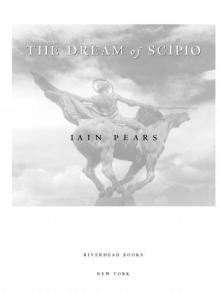 The Dream of Scipio
The Dream of Scipio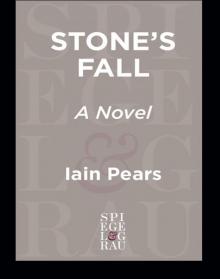 Stone's Fall
Stone's Fall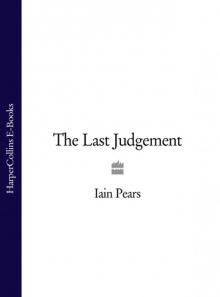 The Last Judgement
The Last Judgement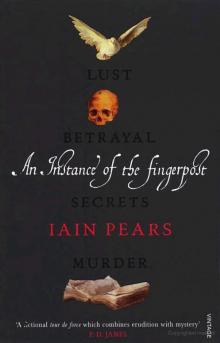 An Instance of the Fingerpost
An Instance of the Fingerpost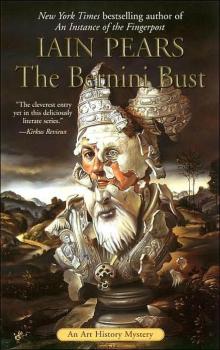 The Bernini Bust
The Bernini Bust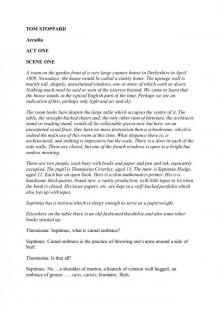 Arcadia
Arcadia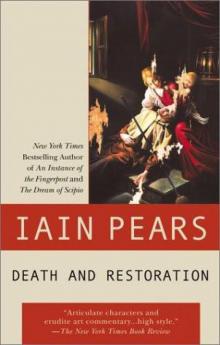 Death and Restoration
Death and Restoration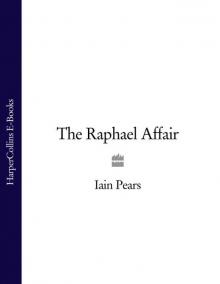 The Raphael Affair
The Raphael Affair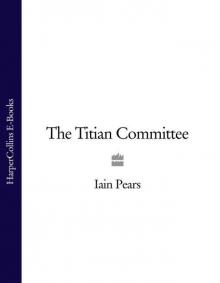 The Titian Committee
The Titian Committee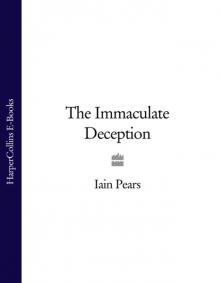 The Immaculate Deception
The Immaculate Deception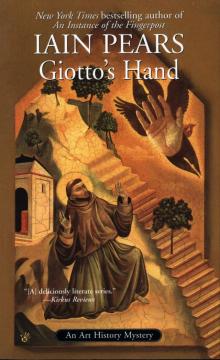 Giotto's hand
Giotto's hand The Portrait
The Portrait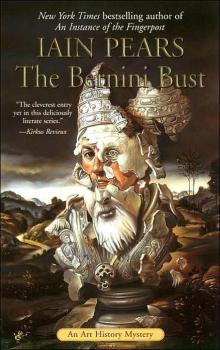 The Bernini Bust ja-3
The Bernini Bust ja-3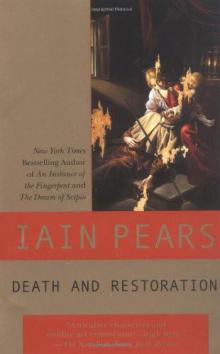 Death & Restoration ja-6
Death & Restoration ja-6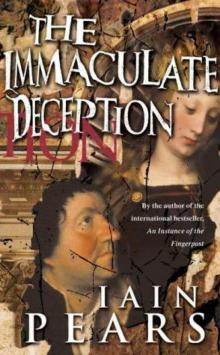 The Immaculate Deception ja-7
The Immaculate Deception ja-7